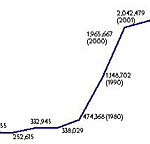Debate: Should felons vote?
By Elizabeth Stawicki
Minnesota Public Radio
November 16, 2001
|
| RealAudio |
An overview | Accountability in the justice system | American Indians and the rural justice system | The new disparities | Driving while black
Civil rights groups across the nation are challenging laws that ban convicted felons from voting. They argue the laws are outdated, racist and dilute the voting strength of people of color. Such laws vary widely from state to state. In Vermont, prisoners may vote. In Florida, convicted felons lose the right to vote permanently. Convicted felons may vote only after they've served their sentences and completed probation.
| |
|
|
|
||
The disenfranchisement of felons evolved from the medieval practice of banishment. If you violate the laws of the state, the state can cast you out. In modern U.S history, the ban was enacted to keep newly freed slaves from voting. Later it was believed the ban promoted progressive, so-called good government reforms.
The Voting Rights Project of the Lawyer's Committee on Civil Rights has challenged Florida's law that bars felons from voting even after they've served their sentences and probation.
The project's director, Anita Hotchkiss, says Florida's law - and others like it - are unconstitutional. "In the first instance we thought it was a racially motivated provision. But we also think that it's a violation of the Voting Rights Act because it disproportionately denies the vote to black voters," Hotchkiss says.
Minnesota's law is less restrictive than Florida's, but it is more restrictive than Vermont's, which allows even prisoners to vote.
John, 33, from Minneapolis wants to vote but can't until he's off probation in several years. "I know there are a lot of people who look at felons as being people who aren't interested in voting or don't follow politics. But as far as me, I'm married and I have a family and I have two sons and I'm concerned about their future; I'm concerned about the future of this state and this country," he says.
John is on probation for felony assault. Other felonies include manslaughter, rape, robbery with a gun, forging checks over $250 - essentially, any crime that a judge can sentence a person to at least a year and a day in jail.
University of Minnesota sociologist Christopher Uggen says the number of voters in Minnesota who can't vote because they're either in prison or on probation is 46,000 out of an eligible 3.5 million.
Disenfranchised African-Americans outnumber whites 10-1. Uggen also looked at how many would've voted Democrat or Republican. "And in that analysis, we were very surprised the strong Democrat Party preferences; in some elections, upward of 90 percent, always a clear majority of the disenfranchised felony voters would have voted for Democrats and we looked at every Senate election since 1972," according to Uggen.
| |
|
|
|
||
In Kentucky, convicted felons are allowed to vote only with the governor's permission.
"People in Kentucky and in Minnesota and every other state are not keeping these convicted felons out of the voting booths; convicted felons did it to themselves," says Ray Larson, the commonwealth's attorney for Lexington and Fayette County in Kentucky, supports laws that ban felons from voting.
"We're sorry they have to live with the consequences of their acts, but that's just too bad. They should've thought about that before they committed the crime. This is serious business, voting is serious. If you're not willing to accept the responsibilities of citizenship, you shouldn't have the benefits of citizenship," Larson says.
The Voting Rights Project says it has no immediate plans to challenge Minnesota's law. However, the project has challenged Washington State, which - like Minnesota - bars felons from voting until after probation. The judge in that case ruled that while the provision does affect minorities disproportionately, there's no evidence the law, itself, discriminates. That case is now pending before the 9th Circuit Court of Appeals.
FOR MORE INFORMATION
•The Sentencing Project's report on disenfranchisement


